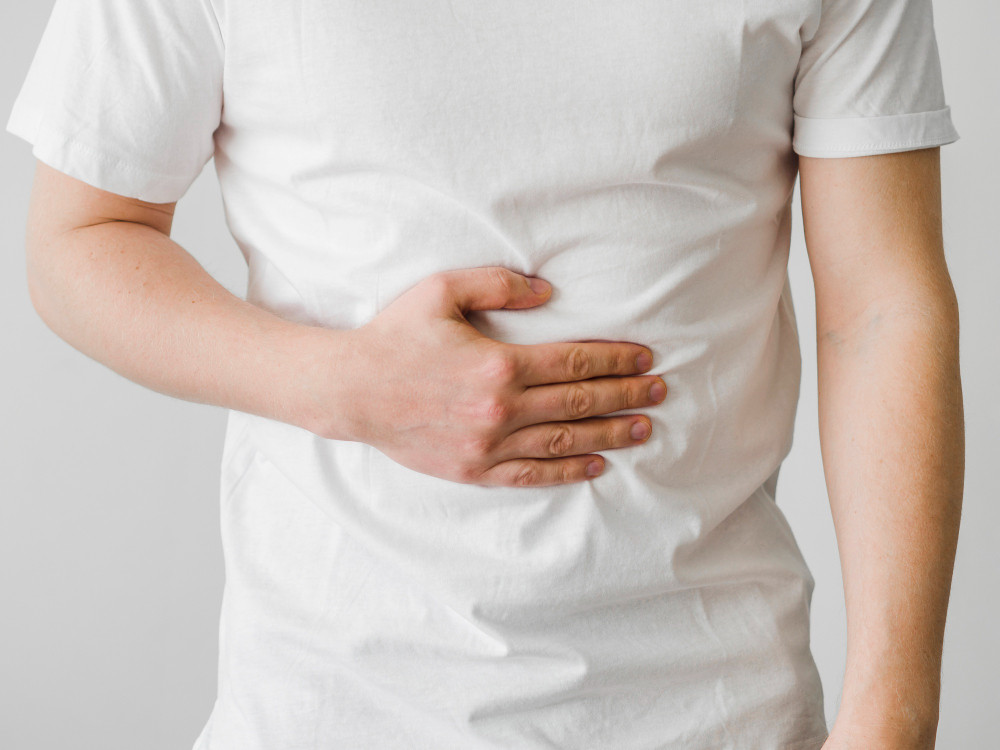Upper abdominal pain often makes you feel uncomfortable and can be caused by various factors, ranging from minor issues to serious medical conditions. What are the causes of upper abdominal pain? Check it out in the following article.
Causes of upper abdominal pain
Upper abdominal pain is typically a mild issue, similar to muscle pain, that resolves on its own. The upper abdomen contains a variety of organs, including the spleen, liver, pancreas, gallbladder, and bile ducts.
If upper abdominal pain is accompanied by other symptoms, further investigation is required to determine whether there is a problem with these organs. Here are some causes of upper abdominal pain:
1. Digestive Disorders
Digestive disorders, or dyspepsia, are common causes of upper abdominal pain. This condition is often caused by overeating, eating too quickly, or consuming spicy and fatty foods. Symptoms that may arise include:
- Bloating
- Nausea
- Vomiting
- Feeling of fullness
- Burning sensation in the throat or stomach
2. Gastritis (Stomach inflammation)
Gastritis is an inflammation of the stomach lining. certain lifestyle factors, such as stress, alcohol consumption, and certain medications, can all cause inflammation. Gastritis can lead to erosive gastritis, characterized by lesions in the stomach lining, or non-erosive gastritis, typically caused by Helicobacter pylori infection.
3. GERD (Gastroesophageal reflux disease)
GERD is a condition in which stomach acid refluxes into the esophagus. This irritates the esophageal lining, causing symptoms such as nausea, chest pain, difficulty swallowing, vomiting, a lump in the throat, shortness of breath, and coughing.
4. Gallstones
The gallbladder is an organ located on the right side of the abdomen, beneath the liver. It releases bile to aid in digestion. When the digestive fluid in the gallbladder hardens, gallstones form. Small gallstones may not cause symptoms and can pass on their own. But larger gallstones can be painful. If not treated properly, they can cause inflammation around the gallbladder and could lead to gallbladder removal.
5. Appendicitis
Upper abdominal pain may indicate inflammation of the appendix or appendicitis. This inflammation is caused by a blockage in the large intestine, leading to swelling and pus in the appendix. If not properly treated, the appendix can rupture.
6. Pancreatitis
Pancreatitis or inflammation of the pancreas, can be acute or chronic. This inflammation can result from alcohol use, gallstones, infections, certain medications, or genetic history. In addition to upper abdominal pain, symptoms of pancreatitis may include severe abdominal pain radiating to the back, fever, rapid heartbeat, and vomiting.
7. Pneumonia
Upper abdominal pain can be caused by pneumonia, an inflammation of the air sacs in the lungs. In pneumonia, air sacs may fill with fluid or pus, causing abdominal pain and difficulty breathing. If the lower lobes of the lungs are infected, this can result in sharp, stabbing abdominal pain.
8. Heart attack
Heart attacks and dyspepsia can sometimes have similar symptoms. Aside from abdominal and chest pain, a heart attack can cause pain in the arm, neck, and shoulder. Other symptoms may include shortness of breath and excessive sweating.
The causes of upper abdominal pain can vary widely. If you have unusual abdominal pain that does not go away and is accompanied by other symptoms, you should see a doctor to get an accurate diagnosis and treatment.
If you need medical advice or consultation, you can either visit a doctor or make use of the consultation features that are available in the Ai Care application by downloading the Ai Care application from the App Store or Play Store.
Looking for more information about other diseases? Click here!
- Sean Edbert Lim, MBBS
Cleveland Clinic. Upper Abdominal Pain. Available from: https://my.clevelandclinic.org/health/symptoms/24736-upper-abdominal-pain
Villines, Z. (2023). What causes upper stomach pain?. Available from: https://www.medicalnewstoday.com/articles/324591
Bottaro, A. (2023). What Causes Upper Abdominal Pain?. Available from: https://www.verywellhealth.com/upper-abdominal-pain-5186178











